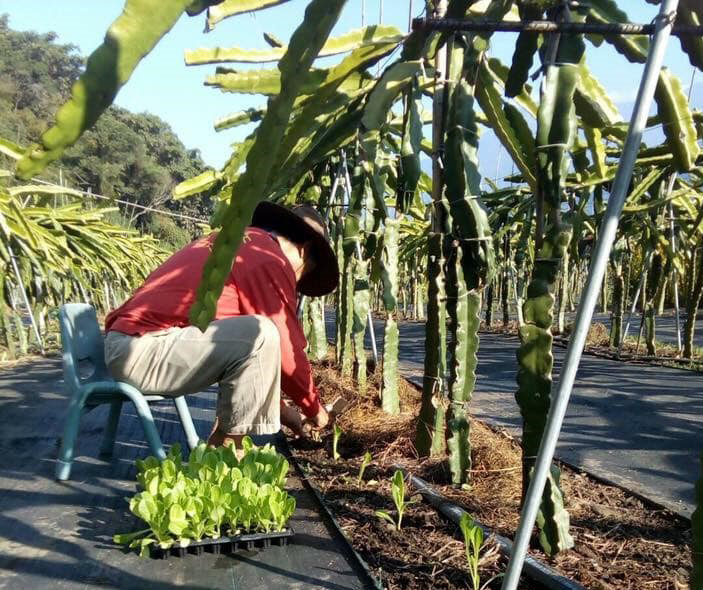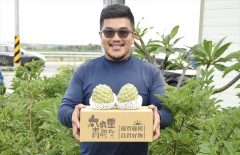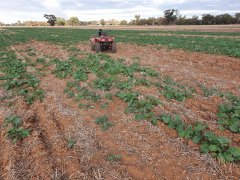Take root in tribal culture and create a brand-new agricultural economy
Take root in tribal culture and create a new original peasant economy.
In order to promote tribal organic agriculture, a "tribal e-purchase" platform was set up to teach tribal farmers to promote season-limited agricultural marketing and support the operation of the sales platform. (photo courtesy of / Association legal person Association for the Promotion of Taiwan Institute of Aboriginal nationalities)
(photo courtesy of Zhang Yaru / tribal e-purchase: fan page of aboriginal tribal common production and marketing platform
In 1999, the earth-shaking 921 earthquake hit many Taiwan's aboriginal tribes, but it also brought tribal workers together. They cherish the connection between people and land, rally tribal forces, practice organic agriculture, carry forward the spirit of sharing among indigenous people, establish a sales platform and production and marketing model belonging to tribes, and establish a cultural and creative space for aboriginal culture and organic agriculture in the future. to create a new indigenous peasant economy that belongs to the native industry.
Set up a sales platform to assist tribes in supporting their own industries
"our chance of establishment has nothing to do with agriculture. Jin Hui-wen, director of the Association for the Promotion of Taiwan's Institute of Aboriginal nationalities, laughs that originally in order to inherit and promote educational and cultural undertakings, tribal farmers took the initiative to market grapes grown by local production and marketing classes in Hsin Yi Township, Nantou County, so a "tribal e-purchase" platform was set up. Through pooling marketing resources, tribal farmers are taught to promote season-limited agricultural marketing, support the operation of sales platforms, improve production technology, improve the agricultural environment, and further assist tribal reconstruction and self-supporting industries.
Step into organic agriculture and grow and thrive with tribes.
It is not difficult for aborigines to engage in organic farming. Their farming methods already adhere to the spirit of symbiosis with nature. "being organic is a way to help tribes rebuild and support their own industries. Jin Huiwen further said that organic agriculture can be different from general market products, so it is quite suitable for tribes.
Through the establishment of a "tribal e-shopping" online sales platform, the original Promotion Association will enable the tribe to engage in organic agriculture and then support their own industry. (photo courtesy of / Association legal person Association for the Promotion of Taiwan Institute of Aboriginal nationalities)
At the end of 2007, teacher Wu Meimian, who promoted tribal organic agriculture, went to the original Promotion Association, hoping that they could regularly sell the tribe's organic fruits and vegetables, but the way they were sold was completely different from that of the normal season, and the organic market in Taiwan was not large at that time. It took nearly a year for the association to take over. During this period of time, it coincided with the adoption of the measures for the Management of the Certification of Organic Agricultural products and Organic processed products, and the original Promotion Association, which was already working hard on the road of organic, was eager to try. The association even followed the verification units to various tribes for nearly half a year to learn about the details of organic verification, and even paid verification fees for farmers in advance. From recording the production process of crops to available organic fertilizers and materials, reminding farmers to leave receipts for the purchase of materials. Communicate patiently with the farmers, accompany the tribe all the way, and learn and grow together with the farmers.
Jin Huiwen said that since 2017, the Agriculture and Food Department began to approve the "environment-friendly farming promotion group." the original Promotion Association has become the third friendly farming promotion group in Taiwan, and the Agriculture and Food Department has even helped to organize a number of marketing activities. so that tribal farmers who have not passed the organic verification have a friendly farming identity card, which is separated from the general practice of farming, so that the association will be exposed to more farmers who want to change their farming methods. And encourage them to move towards organic agriculture.
Jin Huiwen promotes friendly farming to the farmers of the Taiya tribe in Wufeng Township, Hsinchu County.
Gather the strength of the tribes to practice the concept of PGS common production and marketing
Compared with the general organic agriculture through third-party verification, when consumers and producers do not know each other and identify and buy organic agricultural products, the participatory Security system (Participatory Guarantee Systems, referred to as PGS) emphasizes the interaction between producers and consumers, the formulation of farming standards and the establishment of trust through the participation of multi-stakeholders. At first, Jin Huiwen thought that the PGS strategy was quite incredible. How could farmers be allowed to set their own standards and conform to organic farming?. However, at that time, due to the limited manpower of the association, it was difficult to maintain close contact with the 40 or 50 farmers who cooperated, and the farmers responded to such issues as the high cost of verification and their unwillingness to step into organic agriculture. It was only then that Jin Huiwen began to learn more about PGS. In 2014, in parallel with organic agriculture, it took six to seven years to gradually develop a PGS model belonging to the association.
The association has set up regional agricultural associations in five regions, Hsinchu, Nantou, Chiayi, Hualien and Pingtung, to develop the characteristics of agricultural products in each district with the concept of PGS manor. Every month, various districts gather for a PGS consensus meeting, and usually discuss production technology, diseases and insect pests, marketing channels, and the development direction of the future organization through online groups.
In 2019, Kim Huiwen represented Taiwan and went to South Korea to participate in the International Organic Farmers' Union.
"to be honest, the farmers were not active at first. "Jin Huiwen is not discouraged. After several years of continuous operation, she has gradually formed a base for information gathering and transmission through online groups exchanging agricultural information, narrowing the distance between farmers in various districts, and even speaking actively at monthly meetings. New ideas and different practices will also be discussed together. With the joint efforts of the association and farmers, tribal e-shopping in 2016 became the first area in Taiwan to be recognized by the International Organic Agriculture Alliance (IFOAM) participatory security system PGS, which is listed on the IFOAM-PGS global map.
It is imperative to break up into parts and transform the industry.
With the improvement of the visibility of the organic industry in Taiwan, large stores and supermarkets such as Carrefour and Quanlian have also joined the ranks of selling organic agricultural products, making the competition in the general environment more fierce, and the performance of many small organic stores has been relatively affected. Jin Huiwen says that tribal e-shoppers cannot achieve mass production and quality standardization, and the main access is these small organic stores. When the living space is constantly squeezed, how can they find a way to survive in large channels?.
Jin Huiwen took the lead in proposing the strategy of breaking up into parts, changing the distribution mechanism of centralizing the delivery of food to the general loading yard in the north, breaking it up to four locations in Xinbei, Nantou, Hsinchu, and Hualien, reducing transportation costs and loss rates, and according to the consumption characteristics of each region, given different tasks. Xinbei is close to the greater Taipei consumer market, focusing on marketing and promotion, with simple collection of goods without sub-packing; the main sub-loading yard is moved back to Nantou headquarters, while the medium-sized sub-loading yard is located in the suburbs of Hsinchu and Hualien. Since the change of the distribution mechanism at the beginning of 2020, not only the consumption rate has been effectively reduced, but also the transportation cost has been saved by about 1/3 compared with the past. "in the future, we also hope to set up a stronghold in Pingtung to serve the farmers in the central and southern part of the country. "

The vegetables under the dragon fruit have grown and are ready to go to the former farmers' association sub-assembly yard in Nantou district.
Jin Huiwen broke up the former farmers' associations in various parts of Taiwan and combined them with independent bookstores and sub-loading yards to become a diversified space for original farmers to share.
The birth of the space shared by the original farmers with the integration of traditional culture
In order to break through the past business model, the second focus of the tribe's e-shopping transformation-online and offline. In addition to the existing online platform, tribal e-shopping to set up strongholds in Hsinchu and Hualien is not only a simple function of sub-loading, but also combines agriculture and aboriginal culture to plan the space shared by indigenous farmers in a complex mode of management. to show the rich features of aboriginal industry, culture, diet, and so on.
Consumers can not only see books on aboriginal culture and related topics in the store, eat meals and drinks made from crops with indigenous characteristics, but also occasionally encounter tribal farmers coming in to deliver vegetables and cabbages. "Agriculture is the foundation of culture. Why can't selling vegetables and books be combined? Jin Huiwen said that she plans to plant special crops around the stronghold, such as red quinoa, Ramie, and tree beans, so that this is not only a space for cultural creation, but also more like walking into the daily life of the tribe, passing on the value of aboriginal industry, history, and culture to consumers.
Bitter eggplant, a unique agricultural product in Hualien, is called a tire by the Ami people. although it tastes similar to balsam pear, it will be sweet after it is imported.
Diversified and sustainable joint management tightens the producing area and farmers
"We want farmers to know that the e-shopping of the tribe is nearby and that everyone is part of the business. Jin Huiwen stresses that the sharing space for original farmers in various districts is deliberately set up close to the producing area. For example, the sharing space for original farmers in Hsinchu is at the entrance of Jianshi Township, and farmers can deliver vegetables directly to Jianshi Township. There is no need to mail homes for matching, and they can be packed nearby. I also look forward to increasing interaction with tribal farmers and invigorating feelings in this way. Jin Huiwen believes that farmers can see these processes on the spot, understand the entire cost structure and market demand, learn directly from implementation, and cultivate the ability to operate independently.
Jin Huiwen, director of the Association for the Promotion of Taiwan Institute for Aboriginal nationalities.
There is no need for gorgeous decoration, let alone the quintessence of the city center. Jin Huiwen's original farmers' sharing space is inseparable from the origin and farmers. "as long as you have the same idea, you can find us no matter how remote. "it is also expected that more tribal young people will return to their hometown to start their own businesses in the future and move forward to the beautiful vision of the sustainable development of the tribe.
- Prev

Green Farmer Li Junyi Friendly Environment Grass Cultivation Successful Marketing of Organic Sakyamuni in Taitung
Li Chun-yi, an alumnus of Providence University, once worked as a part-time student and director of a concert company, returning to Taitung to plant Sakyamuni. He went from being an urban youth to a farmer, overcoming the doubts of the surrounding people to prove that the environment-friendly "grass cultivation" method is correct.
- Next

Severe rodent infestation in eastern Australia "rat rain" appeared in warehouse equipment.
Rodent infestation is serious in eastern Australia in the past half a year, and farmers are facing the worst rodent damage in decades. Footage of local rodents spread on the Internet, in which Australian journalist Lucy Thackray released a video through Twitter, which shows that farmers are clearing their warehouses when a lot of rats
Related
- A one-day flower show brings 130 million yuan in orders! Nanhai, this Phalaenopsis exhibition is amazing
- What do the flower language and meaning of Lutheran tree mean? Precautions for planting Lutheran tree
- Encounter Chaoshan Kongfu tea, not without this cup of Phoenix single clump
- The durian market in Vietnam and Thailand is flooded. The price of imported durian has plummeted by 30-40% in a month.
- Shanghai solved the problem of local vegetable supply by planting 80,000 mu of green leafy vegetables.
- Wageningen University has become the best agricultural university in the world for the seventh time in a row.
- The strongest export season of South African grapes is full of challenges, with exports to Russia falling sharply by 21%.
- Sri Lanka is on the verge of bankruptcy, "Tea for debt" Organic Agriculture Revolution aggravates the Food crisis?
- Turning waste into earthworm manure and worm manure into organic fertilizer-A new choice for auxiliary farming
- Organic rice growers shoulder the responsibility of nurturing agricultural talents! Yinchuan Sustainable Farm with Organic Life Camp

